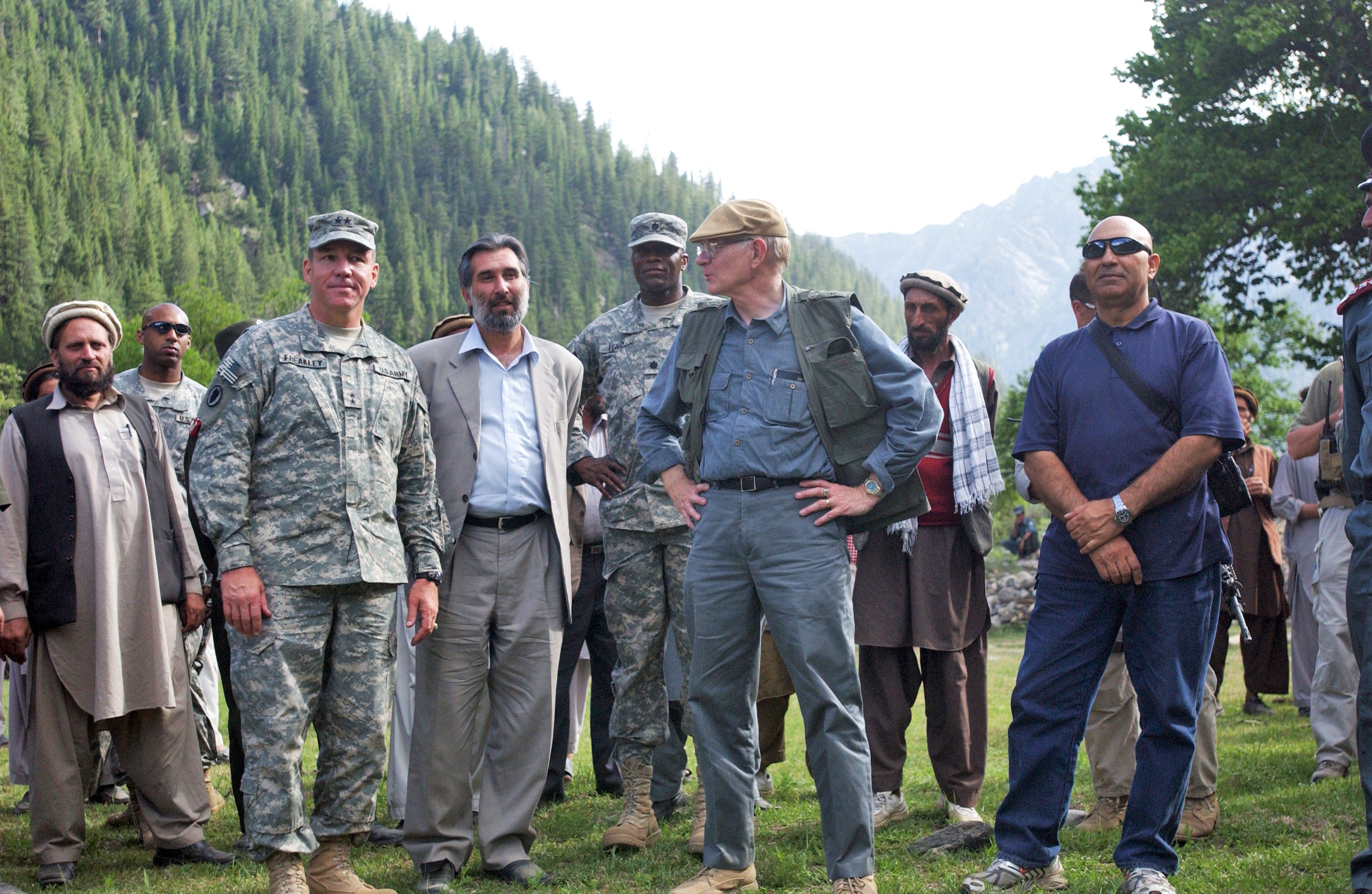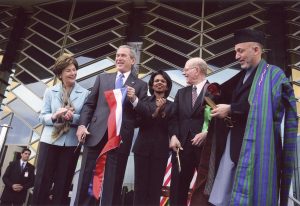The September 11 attacks, now 24 years past, launched a two-decade war in Afghanistan that left nearly 2,500 U.S. troops dead and more than 20,000 wounded. After more than 20 years of American blood and treasure spent in Afghanistan, the country has returned to Taliban rule, leaving the United States to confront a war fought in the name of defense but defined by uncertainty, human suffering, and the unresolved question first posed on 9/11: How can a nation protect itself from threats without compromising the principles it claims to uphold?
To explore these questions, I met on August 22 with Ronald E. Neumann, who served as the ambassador of the United States to Afghanistan from 2005 to 2007 and is now president of the American Academy for Diplomacy. His assessment was blunt: “America panicked.”
The empty U.S. embassy in Kabul, once the largest American diplomatic outpost in Asia, stands as a testament to that panic.
Neumann, who is also a Vietnam War infantry veteran, maintained that the United States could have stayed in Afghanistan more easily than attempting a return, noting that Germany, Britain, and Italy were willing to continue their presence. Instead, then-President Joe Biden insisted on a full withdrawal, offering explanations that Neumann deemed misleading or incomplete.
The full withdrawal of U.S. troops in August 2021 ended the longest war in American history but exposed the fragility of the institutions and alliances Washington had sought to build, and the ensuing chaotic airlift, coupled with the rapid collapse of a government funded with trillions of U.S. dollars, evoked another historic fall, recalling the desperate final hours of Saigon in 1975.
The fates of Kabul and Saigon, two cities scarred by protracted war and abrupt U.S. departures, are forever entwined through haunting images of desperate people clinging to military planes, hoping to escape, and grasping at the promise of security history has too often denied them. These images are more than photographs; they are enduring reminders of the limits of power and planning, and of the human consequences that ripple outward when strategic ambitions collide with political reality.
A friend of mine, a journalist, was among the thousands at Kabul airport in August 2021. He narrowly escaped the Abbey Gate bombing that killed 13 U.S. troops and over 170 Afghans.
Four years later, many Afghans – both those who stayed and those who left the country, like my friend now living in France – continue to ask how a superpower could withdraw so hastily. Both nations continue to bear the cost of that panic. For Afghanistan, the most significant problem is the political void and the Taliban government’s lack of legitimacy, which serve as the root cause of other crises, including widespread poverty and a collapsed economy.
Neumann acknowledged that the full withdrawal — including the U.S. diplomatic presence — created a vacuum that the United States struggles to fill. “We did not have to leave. I believe we could have stayed even with the Taliban in power, but we panicked.”
His view is also informed by the war in Vietnam, where decades of investment, training, and military engagement ended abruptly, leaving long-term consequences, including diplomatic isolation, economic hardship, and unresolved questions.
In Vietnam, the Soviet Union quickly filled the gap after U.S. withdrawal, and only decades later did Washington and Hanoi rebuild ties, a reminder that former adversaries can cooperate when interests align. But for Afghanistan, the stakes are high, and time is critical; by 2023, the U.N. said approximately 97 percent of Afghanistan’s population was living below the poverty line. The recent earthquake in the eastern provinces that claimed thousands of lives exposed the country’s fragility, while the Taliban government struggles under the weight of sanctions and hundreds of thousands of returning refugees.
Russia has formally recognized the Taliban government, but its economic weakness and global isolation limit its influence. China keeps an embassy in Kabul without granting full recognition, balancing pragmatic ties with regional power dynamics and U.S. policy in the region, while India, a key regional actor, has historically maintained a cautious stance, avoiding bold initiatives.
For the Taliban government, the United States – despite a fraught history and the group’s continued designation as a global terrorist organization by the U.S. Treasury Department – remains the most powerful political and military actor that could offer a path to stability. Neumann argued that engagement with the Taliban is necessary to maintain strategic flexibility. “We have to talk to the Taliban because if you officially break off all contact, you lose the ability to maneuver when change occurs,” he said.
The Taliban, under the 2020 Doha Agreement with the United States, pledged that Afghanistan’s soil would not be used to threaten American security. Neumann contended that limited cooperation, particularly to counter threats like the Islamic State Khorasan Province, is pragmatic, even while engagement against al-Qaida remains unlikely given the Taliban’s historic protection of the group.
While the question of how to balance security and values is complex, Neumann offered a pragmatic guide: the first priority of the U.S. government is the protection of the United States, not Afghanistan. Engagement with the Taliban should be strategic and limited, cooperating where mutual interests exist, particularly to constrain threats like al-Qaida, but never equating collaboration with friendship.
By maintaining pressure on the Taliban while acting firmly in its own security interest, the United States can navigate the tension between principle and pragmatism, safeguarding national security without endorsing the regime’s broader abuses.
Yet this approach could carry significant risks. Any engagement could inadvertently legitimize a regime that systematically violates human rights, especially against women, and undermine decades of international norms.
Neumann countered that the Taliban can be a functional partner against mutual threats, even if broader ideological differences remain, emphasizing that strategic interests sometimes require difficult compromises. “Right now, probably Daesh [ISKP] is the biggest threat to U.S. security, but that could change,” he added, stressing the importance of working with the Taliban where interests converge while maintaining pressure to control al-Qaida.
The former ambassador is not opposed to a return of U.S. diplomats to Afghanistan but stressed that any U.S. presence would require a change in Taliban behavior. “I believe we want something,” he said, warning against a purely symbolic return: “If we were to go back right now, it would be a great success for the Taliban, and it would only reinforce their policies on women and other issues. If we go back, it has to be for something. Going back is a gift to the Taliban, so there must also be a gift to us.” Any concessions must include protections for women’s rights in Afghanistan, particularly the right of girls to receive an education beyond grade six.

- Then-U.S. Ambassador to Afghanistan Ronald Neumann standing with a group of Afghans in Nuristan Province, in eastern Afghanistan. Courtesy photo provided by Ronald Neumann.
In July 2024, Neumann testified before the Afghanistan War Commission, emphasizing that the pursuit of democracy was never the original aim of the U.S. war. “It started as an invasion caused by the attack of 9/11,” he said. Once U.S. forces were engaged, the central question became how to withdraw responsibly. Strategies varied across four administrations, but, he argued, “I do not believe a single one of them chose democracy as its ultimate policy goal.”
Instead, democracy was used as a tool to try to build a state capable of standing on its own.
“During 20 years in Afghanistan, Washington pursued at least 10 separate policies, each lasting an average of two years,” Neumann said. This constant policy churn, often without consultation with Afghan officials, mirrored mistakes from Vietnam and proved deeply damaging. He cautioned against confusing policy goals with strategy: “Misunderstanding the difference between a policy goal and a strategy will not help.”
Neumann noted that whether democracy can succeed as part of a strategy depends on context and time, a challenge that extends beyond Afghanistan or Vietnam. His testimony and reflections force a pressing question for today: What should the United States’ strategy in Afghanistan be going forward?
Since taking power in 2021, the Taliban have imposed brutal policies against women, banning education for girls beyond grade six, a measure that could constitute a crime against humanity, and barring women from most forms of work, layered atop the near-erasure of media freedom and the dissolution of political parties, undoing key achievements of two decades of U.S. engagement in the country. Afghanistan’s new rulers are contending with ISKP, natural disasters displacing thousands, frozen central bank assets, and crushing poverty. Left unchecked, this fragile balance could collapse into a humanitarian disaster reminiscent of Iraq at its worst.
A decade ago, Neumann told me in an interview that Afghanistan faced “tough days ahead.” In 2021, the last U.S. commander in Afghanistan, General Austin S. Miller, warned that civil war was certainly a path that could be visualized.
When I asked Neumann for his perspective today, he responded cautiously: “Anything is possible.”
He sees multiple plausible scenarios but stresses one reality: Afghans are exhausted by decades of conflict. The future, he said, may not bring open war, but could mean prolonged Taliban rule and continued suffering for the population if conditions do not change.

































